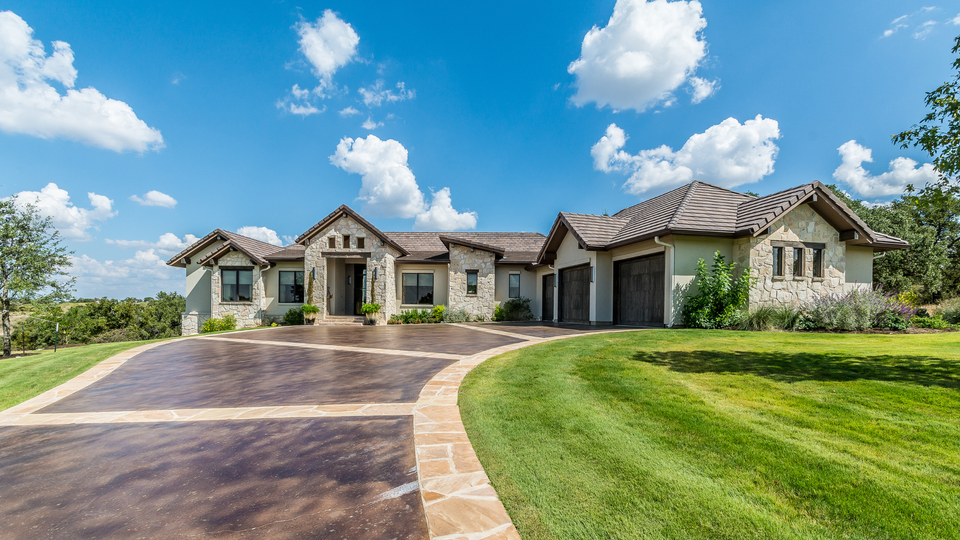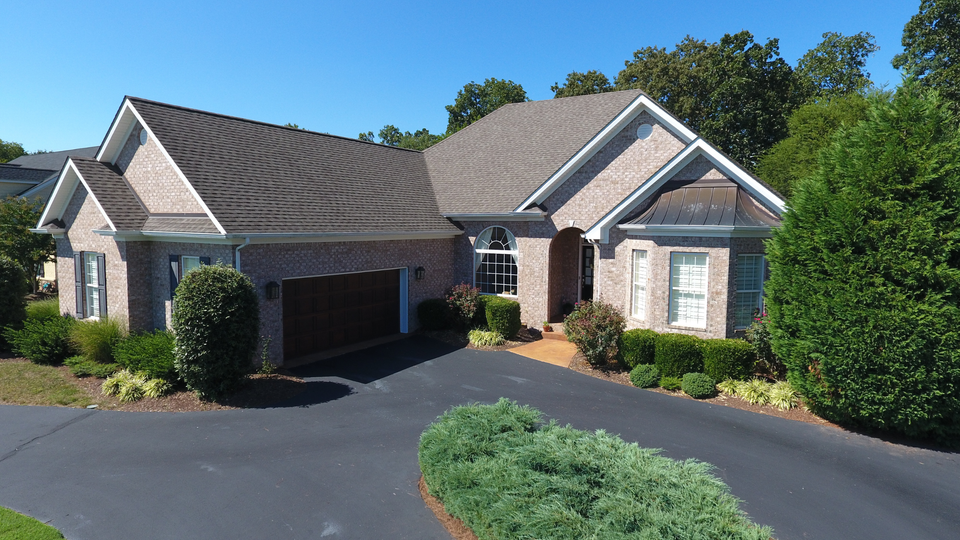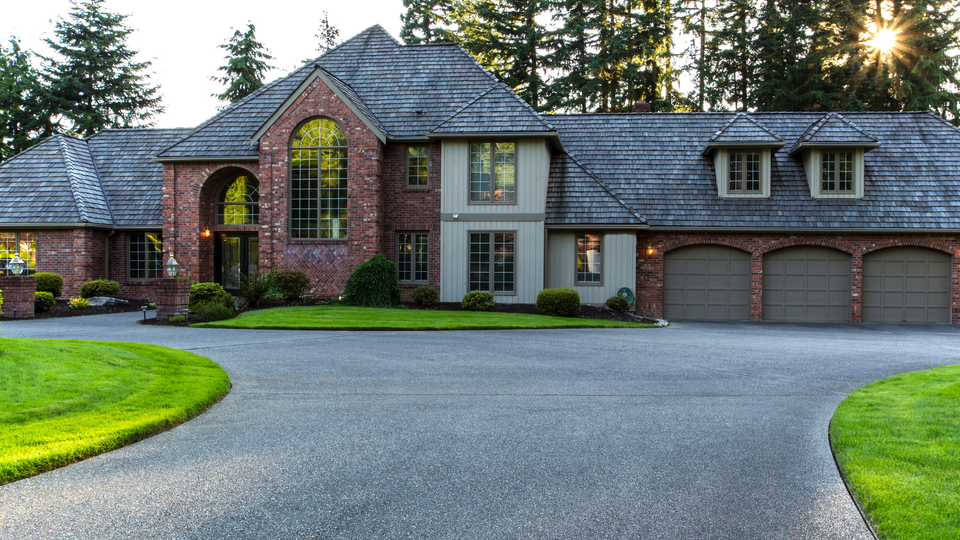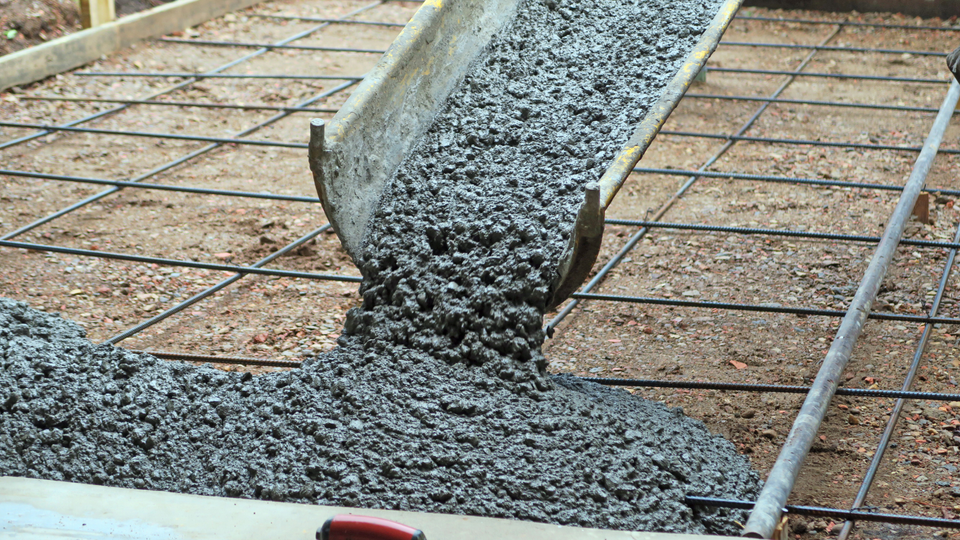

The driveway is often the first impression visitors have of your home. Choosing between an asphalt vs concrete driveway for this crucial exterior element can be a complex decision. Factors such as durability, maintenance, cost, and aesthetics all play a role in selecting the best material for your property.
This article provides a comprehensive comparison of asphalt vs concrete driveways, helping you make an informed choice that enhances your home's value and curb appeal.
This article provides a comprehensive comparison of asphalt vs concrete driveways, helping you make an informed choice that enhances your home's value and curb appeal.
Understanding Asphalt Driveways

An asphalt driveway is made of aggregate (gravel, sand, and stone) mixed with asphalt cement. This black, sticky material binds everything together when heated. Asphalt driveways are popular for their smooth finish and ease of installation.
Benefits of Asphalt Driveways
One major advantage of asphalt driveways is their flexibility. The material can expand and contract without cracking, making it ideal for areas with fluctuating temperatures. Additionally, asphalt driveways are quick to install and can be ready for use within a day or two. This makes them a convenient option for busy homeowners.
Did you know? Asphalt driveways can be resurfaced instead of replaced, saving you money while extending the life of your driveway.
Benefits of Asphalt Driveways
One major advantage of asphalt driveways is their flexibility. The material can expand and contract without cracking, making it ideal for areas with fluctuating temperatures. Additionally, asphalt driveways are quick to install and can be ready for use within a day or two. This makes them a convenient option for busy homeowners.
Did you know? Asphalt driveways can be resurfaced instead of replaced, saving you money while extending the life of your driveway.
Understanding Concrete Driveways
A concrete driveway is made from a mixture of cement, water, sand, and gravel. When poured, the mixture hardens into a solid, durable surface. Concrete driveways are known for their longevity and low maintenance requirements.
Benefits of Concrete Driveways
Concrete driveways are highly durable and can last for decades with proper care. They are also customizable, allowing homeowners to choose from various finishes, colors, and patterns. This makes concrete an attractive option for those looking to enhance their home's curb appeal.
Quick tip: Adding a sealant to your concrete driveway can help protect it from stains and weather damage.
Benefits of Concrete Driveways
Concrete driveways are highly durable and can last for decades with proper care. They are also customizable, allowing homeowners to choose from various finishes, colors, and patterns. This makes concrete an attractive option for those looking to enhance their home's curb appeal.
Quick tip: Adding a sealant to your concrete driveway can help protect it from stains and weather damage.
Asphalt vs Concrete Driveway: Durability and Longevity

When comparing the durability of asphalt vs concrete driveways, both materials have their strengths. However, concrete driveways tend to have a longer lifespan. With proper maintenance, a concrete driveway can last up to 30 years or more. Asphalt driveways typically last around 20 years but may require more frequent maintenance.
Asphalt Durability
Asphalt can become soft and pliable in extreme heat, leading to deformation and rutting. In colder climates, asphalt can be susceptible to frost heaves, causing uneven surfaces.
Concrete Durability
Concrete is rigid and durable, making it less prone to deformation under heavy loads. However, it can crack under extreme pressure or if not properly installed. Protecting your concrete driveway with a sealant can help prevent cracks and extend its lifespan.
Asphalt Durability
Asphalt can become soft and pliable in extreme heat, leading to deformation and rutting. In colder climates, asphalt can be susceptible to frost heaves, causing uneven surfaces.
Concrete Durability
Concrete is rigid and durable, making it less prone to deformation under heavy loads. However, it can crack under extreme pressure or if not properly installed. Protecting your concrete driveway with a sealant can help prevent cracks and extend its lifespan.
Asphalt vs Concrete Driveway: Maintenance Requirements
Maintenance is a crucial factor when considering the cost of an asphalt driveway vs concrete. Both materials require upkeep, but the frequency and type of maintenance differ.
Asphalt Maintenance
Asphalt driveways need to be sealed every 3-5 years to maintain their appearance and prevent damage. Sealing helps protect the surface from water, oil, and UV rays. Potholes and cracks should be repaired promptly to prevent further deterioration.
Concrete Maintenance
Concrete driveways require less maintenance compared to asphalt. However, they should be sealed every few years to protect against stains and weather damage. Cracks in concrete driveways can be repaired with a patching compound, but it's essential to address them early to prevent further damage.
Asphalt Maintenance
Asphalt driveways need to be sealed every 3-5 years to maintain their appearance and prevent damage. Sealing helps protect the surface from water, oil, and UV rays. Potholes and cracks should be repaired promptly to prevent further deterioration.
Concrete Maintenance
Concrete driveways require less maintenance compared to asphalt. However, they should be sealed every few years to protect against stains and weather damage. Cracks in concrete driveways can be repaired with a patching compound, but it's essential to address them early to prevent further damage.
Asphalt vs Concrete Driveway: Cost Analysis

The cost of an asphalt driveway vs concrete can vary depending on several factors, including materials, labor, and location. Generally, asphalt driveways are less expensive to install, but concrete driveways offer better long-term value due to their durability and lower maintenance costs.
Asphalt Driveway Costs
Asphalt driveways generally have a lower upfront cost compared to concrete. However, homeowners should factor in ongoing maintenance expenses, such as regular sealing and repairs, over the driveway’s lifespan.
Concrete Driveway Costs
While concrete driveways typically have a higher initial cost than asphalt, they often require less maintenance over time, leading to potential long-term savings. Additionally, customization options such as stamping and coloring can increase the overall cost but enhance the driveway's appearance.
Asphalt Driveway Costs
Asphalt driveways generally have a lower upfront cost compared to concrete. However, homeowners should factor in ongoing maintenance expenses, such as regular sealing and repairs, over the driveway’s lifespan.
Concrete Driveway Costs
While concrete driveways typically have a higher initial cost than asphalt, they often require less maintenance over time, leading to potential long-term savings. Additionally, customization options such as stamping and coloring can increase the overall cost but enhance the driveway's appearance.
Asphalt vs Concrete Driveway: Installation Process

The installation process for asphalt vs concrete driveways differs in terms of time and complexity.
Asphalt Installation
Installing an asphalt driveway involves several steps, including preparing the base, laying the asphalt, and compacting it to create a smooth, even surface. The process is relatively quick, and the driveway can be ready for use within 24-48 hours.
Concrete Installation
Concrete driveways require more time and precision during installation. The process includes preparing the base, pouring the concrete, and allowing it to cure. Curing takes about 7 days, but the driveway may need up to 30 days to reach its full strength. This extended curing time ensures the driveway's durability and longevity.
Asphalt Installation
Installing an asphalt driveway involves several steps, including preparing the base, laying the asphalt, and compacting it to create a smooth, even surface. The process is relatively quick, and the driveway can be ready for use within 24-48 hours.
Concrete Installation
Concrete driveways require more time and precision during installation. The process includes preparing the base, pouring the concrete, and allowing it to cure. Curing takes about 7 days, but the driveway may need up to 30 days to reach its full strength. This extended curing time ensures the driveway's durability and longevity.
Asphalt vs Concrete Driveway: Climate Considerations
Wisconsin's harsh winters, characterized by freeze-thaw cycles and heavy snowfall, demand a driveway material that can withstand extreme conditions. While both asphalt and concrete have their merits, concrete emerges as the superior choice for this climate.
Asphalt's Achilles Heel
While asphalt's flexibility allows it to reasonably withstand cold temperatures, it suffers in Wisconsin's summer heat. Soft and pliable asphalt can easily deform under the weight of vehicles, leading to unsightly ruts and potholes.
Concrete's Superior Durability
Concrete excels in Wisconsin's challenging climate. Its strength and durability make it resistant to the damage caused by fluctuating temperatures. Moreover, concrete's resistance to de-icing salts, a common wintertime challenge, further enhances its longevity.
Asphalt's Achilles Heel
While asphalt's flexibility allows it to reasonably withstand cold temperatures, it suffers in Wisconsin's summer heat. Soft and pliable asphalt can easily deform under the weight of vehicles, leading to unsightly ruts and potholes.
Concrete's Superior Durability
Concrete excels in Wisconsin's challenging climate. Its strength and durability make it resistant to the damage caused by fluctuating temperatures. Moreover, concrete's resistance to de-icing salts, a common wintertime challenge, further enhances its longevity.
Asphalt vs Concrete Driveway: Aesthetic Appeal

The visual impact of your driveway is an important consideration when comparing asphalt vs concrete driveways. Both materials offer different aesthetic benefits.
Asphalt Aesthetics
Asphalt driveways have a sleek, black finish that complements various architectural styles. While they are limited in customization options, asphalt driveways can be edged with stone or brick for added visual appeal.
Concrete Aesthetics
Concrete driveways offer a wide range of customization options, including colors, patterns, and finishes. Stamping and staining techniques can create unique designs that enhance your home's curb appeal. Concrete driveways can also be combined with other materials, such as pavers or decorative borders, for a personalized look.
Asphalt Aesthetics
Asphalt driveways have a sleek, black finish that complements various architectural styles. While they are limited in customization options, asphalt driveways can be edged with stone or brick for added visual appeal.
Concrete Aesthetics
Concrete driveways offer a wide range of customization options, including colors, patterns, and finishes. Stamping and staining techniques can create unique designs that enhance your home's curb appeal. Concrete driveways can also be combined with other materials, such as pavers or decorative borders, for a personalized look.
Asphalt vs Concrete Driveway: Environmental Impact
The environmental impact of asphalt vs concrete driveways is a growing concern for many homeowners. Both materials have advantages and disadvantages in terms of sustainability.
Asphalt Environmental Impact
Asphalt is recyclable, and many asphalt driveways are made from reclaimed asphalt pavement (RAP). However, the production of asphalt requires significant energy and emits greenhouse gases. Additionally, asphalt surfaces can contribute to urban heat islands, raising temperatures in surrounding areas.
Concrete Environmental Impact
Concrete production has an environmental impact due to the energy-intensive process of cement manufacturing. However, concrete driveways have a longer lifespan, reducing the need for frequent replacements. Permeable concrete options are available, allowing water to pass through the surface and reducing runoff.
Asphalt Environmental Impact
Asphalt is recyclable, and many asphalt driveways are made from reclaimed asphalt pavement (RAP). However, the production of asphalt requires significant energy and emits greenhouse gases. Additionally, asphalt surfaces can contribute to urban heat islands, raising temperatures in surrounding areas.
Concrete Environmental Impact
Concrete production has an environmental impact due to the energy-intensive process of cement manufacturing. However, concrete driveways have a longer lifespan, reducing the need for frequent replacements. Permeable concrete options are available, allowing water to pass through the surface and reducing runoff.
Conclusion
Ultimately, the decision between an asphalt vs concrete driveway depends on your specific needs, budget, and aesthetic preferences. Asphalt offers a cost-effective and quick installation option, while concrete provides superior durability and customization potential.
By carefully evaluating factors such as climate, maintenance requirements, and long-term costs, you can select the driveway material that best compliments your home and lifestyle.
By carefully evaluating factors such as climate, maintenance requirements, and long-term costs, you can select the driveway material that best compliments your home and lifestyle.
